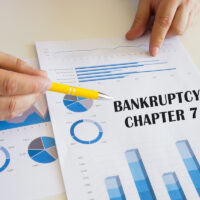How Long Will Bankruptcy Affect My Credit?

Many people are hesitant to file for bankruptcy, even when it would be the best option to relieve their debts, because they are concerned about the damage bankruptcy can do to their credit score. While bankruptcy does affect your credit, the damage is only temporary. Below, we discuss how long a bankruptcy will remain on your credit report, depending upon the type of bankruptcy, and how you can start building your credit back up even while the bankruptcy remains on your report. Call a compassionate Ventura debt relief and bankruptcy attorney for help exploring your debt relief options in Southern California.
Chapter 7 Bankruptcy: Seven to Ten Years
Chapter 7 bankruptcy wipes the slate clean on your covered debts. The trustee will collect and sell certain non-exempt assets and use the proceeds from those sales to pay off as much of your covered debt as possible. Whatever remains of your covered debts will be discharged, leaving you free and clear of those debts. With the help of a bankruptcy attorney, many people get their Chapter 7 discharge without having to sell any assets at all.
The bankruptcy discharge will, however, remain on your credit report for some time. The discharge itself will remain on your credit report for 10 years. Individual accounts included in the bankruptcy will be listed as “included in bankruptcy” or “discharged” and show a balance of $0. Those accounts will disappear from your report after seven years from the date of your bankruptcy filing or, if they were already delinquent when you filed, seven years from the original date of delinquency.
Chapter 13 Bankruptcy: Seven Years
In a Chapter 13 bankruptcy, you work with your creditors and a bankruptcy trustee to establish a repayment plan under which you pay back much of your covered debt over the next three or five years. Collection activities will be halted, and your monthly obligation should be significantly reduced compared to how much you owed to all your creditors prior to bankruptcy. At the end of the repayment period, any covered debts that remain will be discharged.
Your Chapter 13 bankruptcy discharge will then remain as a note on your credit report for seven years. The individual accounts can be washed from your report sooner, as with Chapter 7 bankruptcy, depending on the amount of time the accounts were already delinquent before filing.
You Can Start Building Credit Immediately After Bankruptcy
It’s important to keep in mind that the seven or ten-year rule concerns the duration of time that your bankruptcy will continue to appear on your credit report. That does not mean that your credit is irretrievably tarnished for the entire duration. In fact, by making sound economic choices, you can start building your credit back up soon after obtaining your bankruptcy discharge.
The worst hit to your credit happens just after filing or obtaining a discharge. From that point onward, your credit can and will improve, especially if you make fiscally responsible choices. Credit card companies, mortgagors, and other loan companies are happy to work with people who have a bankruptcy on their record so long as their credit score has improved since the bankruptcy and other factors such as income and assets suggest a healthy financial profile. The loan rates might not be optimal until the bankruptcy fully disappears, but you can work to build your credit back in the meantime. Steps like obtaining a secured credit card and paying it off in full each month can work wonders to quickly improve post-bankruptcy credit.
You can also improve your credit report by monitoring your report following the bankruptcy. Within a few months, the relevant accounts should be marked as “discharged” or “included in bankruptcy”–make sure only the proper accounts are so marked. Once sufficient time has passed since the original delinquency, you can check to make sure that those accounts disappear from your report.
Work Toward Financial Independence With the Help of a Knowledgeable Southern California Debt Relief Attorney
If you are dealing with mounting debt and considering debt relief options including bankruptcy, please contact Rounds & Sutter for a free, confidential consultation. With offices in Ventura, Santa Barbara and Westlake Village, we represent clients throughout Southern California, offering trusted, effective legal counsel in the face of life’s challenges.
